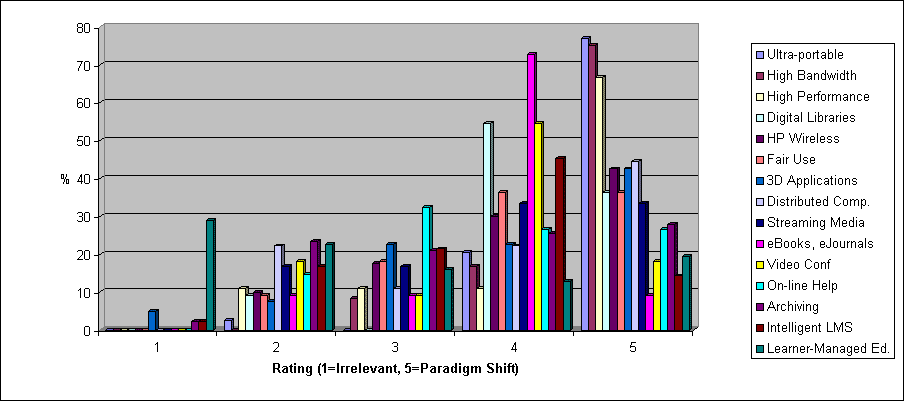Discussion Track 3: Emerging Tools and Technologies
Facilitators: John Felts and Chuck Bennett
Session A: Identify trends. Informal introductions, brainstorming, environmental scanning, idea generation of new tools and technologies. What's out there now, on the horizon, and on the far horizon!
Session B: Identify impact. Which new tools or technologies discussed in the first session offer greatest potential benefits for individual campuses and for the UNC system.
Session C: Next steps. Determine next steps to ensure system campuses are aware of emerging opportunities identified in other breakout sessions. Brainstorm and identify potential campus collaborative projects. Explore/recommend possible joint funding models within UNC and beyond.
Session A: Emerging Trends
Emerging trends were identified, and response pads were used to rate each trend according to the following five categories:
- Irrelevant
- Somewhat Important
- Important
- Very Important
- Extremely Important (Paradigm Shift)
An overall numeric rating was assigned to each trend given by (rating index) * (% of respondents giving that rating).
The following trends were identified (overall numeric rating in parentheses, click link to see poll results):
-
Ultra-portable Computing Devices (472). High resolution screens, high capacity ROM, fast.
-
Next Generation Infrastructures enabled by high bandwidth networks (467). G-bit and beyond.
-
High Performance Personal Computers (433). 10 - 100 GHz, multiprocessor.
-
Digital Libraries (418).
-
High-bandwidth Wireless (405).
-
Fair Use Endangerment (400). New tools will threaten current privileges.
- Three Dimensional Applications (390).
- Distributed Computing (389).
- Streaming Media (383).
- eBooks, eJournals (382).
- Desktop Video Conferencing (373).
-
On-line Help Desk (365). 24 x 7, for faculty and students.
-
Archiving (354). Similar to digital libraries, but two-way storage with security.
-
Intelligent Learning Management Systems (352). Shared and reusable learning objects, data mining.
-
Learner-managed Education (271). No semester boundaries, outcome-based.
Summary of Rating Results:

Session B: Impacts of Trends Identified in Session A
- All impacts have budget and broad policy and legislative implications.
- Campuses must adopt pro-active policies for climate change.
- Faculty Support Teams for technical and pedagogical innovation.
- Technical support for students.
- Technical support for staff.
- Professional development for IT staff and faculty.
- Ergonomics/health issues resulting from portable computing.
- Faculty & rewards and expectations for innovation.
- IT staff recognition and reward.
- Support team recognition.
- R&D support (seed grants).
- Technology refreshment.
- Collaborative Opportunities for sharing innovations and needs - dissemination - cohesive forum
- Broader skill sets for all.
- Theft - especially for very portable equipment.
- Addressing diverse learning styles.
- Decentralized learning.
- Student recruitment and retention.
- Student services (online registrations, library, textbook purchasing, etc).
- Preserve essence of the university: campuses must incorporate technology wisely to avoid high tuition increases.
Session C: Next Steps
The following were identified as possible focus areas for the UNC TLT Collaborative (no particular ordering):
-
Partnerships to achieve high bandwidth connections for off-campus access. Broadband residential access can benefit industry, commerce, k-12 and higher education. Representative groups from these constituencies should collaborate to insure that all regions have access to high-bandwidth internet resources.
-
Seed money grants to promote research and development in technology-enabled innovation.
-
System-wide and regional conferences for dissemination, professional development and collaboration. Focused on IT staff and faculty. Utilize campus dining and residence halls.
-
UNC on-line eJournal. Hosted by the UNC Portal, this resource would provide an electronic forum for faculty and IT professional.
-
Organize a system-wide 24x7 help desk. Support should be flexible and should respond to current emphasis areas. An in-house solution would provide maximum flexibility.
-
Investigate state-wide eJournal licensing and other digital library opportunities.
-
Seek solutions that would provide effective, available and inexpensive video conferencing for collaboration. Collaboration can lead to extensive time and expense from associated travel. H.332 is a possible solution.
-
Establish moderated content areas on the UNC Portal. Focus on current areas of interest within the system. Discussion forums should be available.
-
Establish a Proctored Assessment Network to support on-line teaching. For early efforts, see http://www.uncwil.edu/pan/, and an early article at http://www.uncwil.edu/pan/pan_article.htm.

